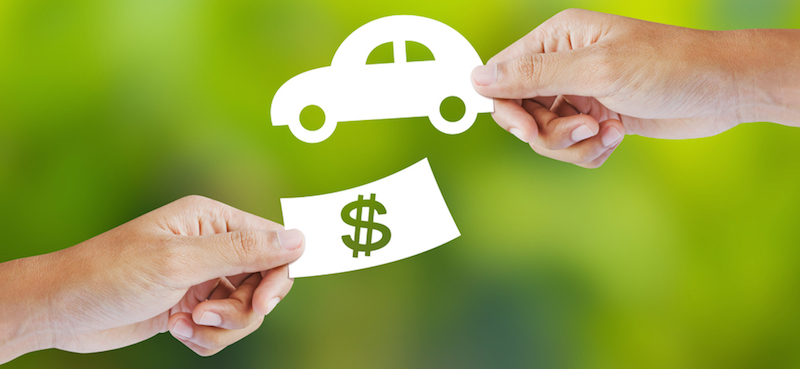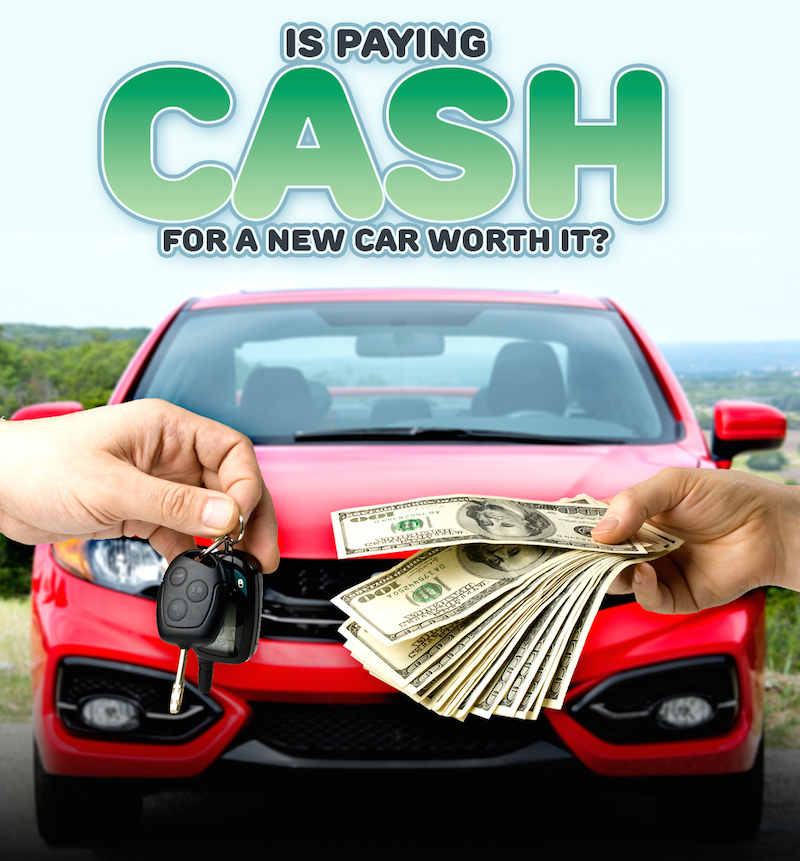
 Your Credit Estimate
Your Credit Estimate
 Your Credit
Your Credit
Your zip code helps us provide you with the most accurate vehicle pricing and vehicle availability.
We estimate your credit score to give you an idea of your monthly payments. To get an accurate payment amount, complete our credit application by clicking the Start Credit Application button below.
start credit application
Well, it sure sounds like a good idea, financially-savvy, even. Besides, it's a position I'm sure we would all like to be in from time to time. Paying cash for a new car seems smart for a number of reasons. But, before you decide to buy a new car online and pay cash for it, consider the flip side of shelling out cash for your car.
Ultimately, the choice to pay cash for your new car is entirely yours. But, we'll take you through the pros and cons of penning a check versus financing when you buy a new car online.
If you have the means to do it, paying cash when you buy a new car online is a tempting notion and with good reason.
Paying in full allows you to own the car completely and immediately, which is great. The pressure of future payments is not something you need to worry about. Avoiding monthly payments means that you'll sidestep potential missed or late payments, which can negatively impact your credit overall.
Avoiding monthly payments also means that you'll avoid paying interest. When you pay cash for a new car, you make that one payment and that's it. With financing, you're going to contend with an interest rate, which is dependent in large part on your credit history and resulting credit score.
So, if you have lousy credit, you know that you'll be at the mercy of a lender who will invariably charge you a higher interest rate.
But, even reputable lenders will charge a higher interest rate because you are considered a risk. Generally, interest rates for those with poor or subprime credit range between ten and thirteen percent, where those with solid credit scores enjoy APRs closer to four and five percent, on average.
Depending on how high that interest rate is, you might have a difficult time managing your monthly payments. In some cases, this leads to late or missed payments, which also negatively impacts your credit.
Basically, any scores of 800 or above are considered "excellent," numbers 750-800 represent "very good" credit, 700-750 means "good," while "fair" credit is found between 650-700, and anything short of 650 is rated "bad." If your credit score is less than 600, you're dealing with a "very bad," or "subprime" credit rating.
Know your score and you'll be able to better evaluate the best course of action.
Also, we all know that new cars depreciate, or lose value, as soon as they're purchased and driven off the lot. If you pay cash, you never have to worry that you'll find yourself in an "upside down" auto loan down the road. In that case, you essentially owe more money on the car than it's actually worth.
Not a good position to be in, and one that is very difficult to get out of, certainly.
Once again, paying cash looks like the more attractive option.
However…

The flip side - and there's always a flip side - is the opportunity. With financing and the right loan, you put yourself in a position to either start building credit for the first time or continue strengthening your existing credit.
Actually, financing can be a strategic option for those consumers who have poor, or even subprime, credit scores because it provides a chance to right the course, so to speak. You can start fixing them damage done to your credit score by finding a loan which has a realistic monthly payment.
Making those monthly payments on time actually starts repairing credit damage faster than you might think.
In addition to your credit history and score, you need to take a close look at your actual budget. Ask yourself what you intend to pay for a car. Any car - used or new. If, say, you know that you have $10,000 to spend on a used car, you might want to reconsider the used option.
With a $10,000 down payment on a new car, you'll be able to enjoy the most up-to-date technologies with respect to performance, safety, and convenience. This is especially true for those shoppers who have good credit.
A hefty down payment from a consumer with a respectable credit score will open the doors (literally) to all sorts of cutting-edge and competitive new cars.
The beauty of a new car versus a used car is the warranty protection and coverage that is available. Although some used cars, specifically, certified pre-owned cars, do come with some extended warranties and protection, a new car always takes the lead because there are no unknowns, relative to the previous owner's driving behavior and the overall wear and tear on the vehicle.
The decision to buy with cash or finance the car really comes down to two little words: interest rate.
As Smokey Robinson and The Miracles sang about relationships, "You Better Shop Around." The same is true of interest rates. With a little research and comparison shopping, you should be able to find a low-interest rate. If you do, you might find yourself in a situation in which holding onto your money is best.
Let's look at the math…
Imagine that you've already approached various reputable lenders, like your trusted bank or credit union, for example, and you have been offered a one percent interest rate. With such a low rate, you're best option is to squirrel your money away for a rainy day and take advantage of the financing.
We can prove it.
Okay, so you've locked in the one percent interest rate. You've already set your sights on a specific car and its sticker price is $30,000. Simply put, you can go ahead and drop the cash, knowing that you'll never make another payment on this particular set of wheels.
Or, you can pursue your financing option, in which case, you'll want to put a portion of that $30,000 into a down payment. So, you decide to fork over $5,000 and make monthly payments over the course of three years at the one percent APR.
You'll keep $25,000 in your bank account, and will end up paying only $640 in interest on the entire loan. Put it this way - Do you think it's worth shelling out $640 in order to keep $25,000 in your bank or investment account where it can mature?
The answer here is yes, of course! Leave that money in your account and you'll make back what you'll end up paying in interest over the course of the loan term without even thinking about it.
As with most financial decisions, the right way to go rests in your own personal financial reality. Keep it simple and review the numbers. After all, they don't lie.